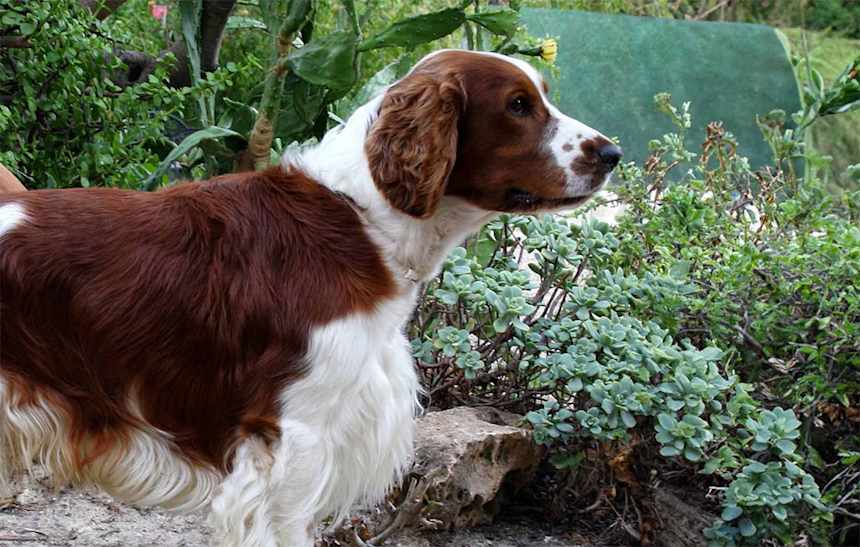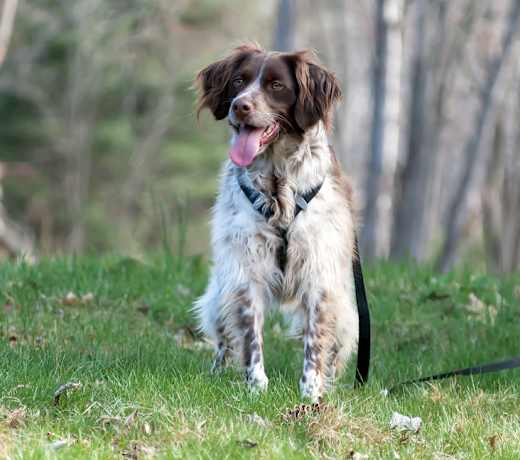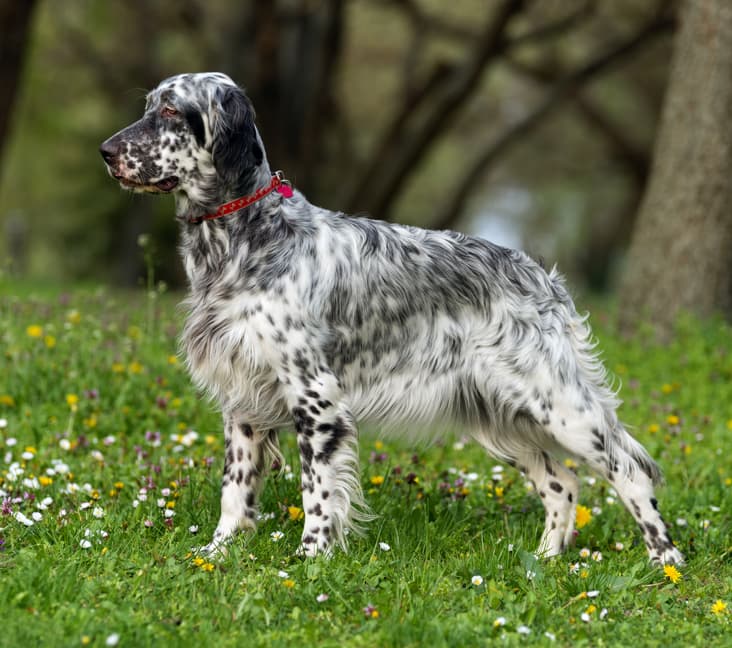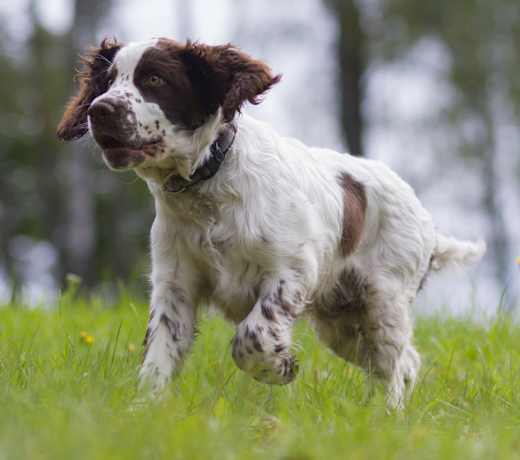The Welsh Springer Spaniel comes in one color in terms of the breed standard: red and white. Their coat has patterns of red ticking across the white.
Welsh Springer Spaniel
Breed Type: Sporting
Common nicknames: Welshie, Welsh Springer, Welsh Starter
Coat: Double
Hypoallergenic: No, they will likely trigger allergies.
Temperament: Affectionate, intelligent, energetic, sensitive
Life expectancy: 12-15 years
Color & patterns: Red and white

Get ready to hit the ground running with the Welsh Springer Spaniel, an energetic and enthusiastic dog. These pups have a stunning coat of red and white, resembling a fiery sunset, and exude a cool vibe. Welsh Springer Spaniels are eager to please, and their athletic prowess and boundless energy make them the perfect pal for outdoor activities and exploration. They make great co-pilots for road trips and snuggle buddies during movie marathons too. So, if you’re looking for a pup that’s as adventurous as Indiana Jones, the Welsh Springer Spaniel is ready to join you.
Welsh Springer Spaniel characteristics
Learn about about Welsh Springer Spaniel basics like their fur colors, shedding levels, how much grooming they need, and other Welsh Springer Spaniel facts.
Average height
19-21 inches (48.3-53.3cm)
Average weight
32-56 pounds (14.5-25.4 kg)
Average lifespan
12-15 years
Exercise needs
Grooming needs
Full-grown size
Good with cats
Good with kids
Training aptitude
How big are Welsh Springer Spaniels?
Welsh Springer Spaniels are medium-sized dogs, most weighing 35 to 55 pounds and standing around 17 to 19 inches tall, with males generally being taller than females.
Do Welsh Springer Spaniels shed?
Yes, Welsh Springer Spaniels are moderate shedders. Regular grooming, including brushing, can help manage shedding and keep their coat healthy.
Welsh Springer Spaniel temperament
Learn about about the Welsh Springer Spaniel temperament and how well they fit into your lifestyle, home environment, and family.
Are Welsh Springer Spaniels good with kids?
Yes, Welsh Springer Spaniels are wonderful around children. Like most spaniels, they are both gentle and playful.
As with any breed, it is recommended that your child always be supervised when interacting with your Welsh Springer Spaniel to ensure the safety of both the child and the dog. Teaching children how to properly approach and handle dogs is crucial to ensure positive experiences for both the dog and the child, as is teaching dogs how to interact gently with children.
Are Welsh Springer Spaniels good with cats?
Yes, the Welsh Springer Spaniel can coexist peacefully with cats. Of course, each cat has their own preferences and temperaments, but if introduced early, and both pets have compatible temperaments and are properly socialized, they should get along fine.
Do Welsh Springer Spaniels bark a lot?
No, Welsh Springer Spaniels do not bark a lot. They will bark to alert or when they feel separation anxiety, but they are not nuisance barkers. As with any dog, however, proper training and exercise can discourage them from barking as frequently.
Are Welsh Springer Spaniels high-maintenance?
No, Welsh Springer Spaniels are not high-maintenance. Still, they need to be brushed weekly to keep their coats looking healthy and unmatted where feathering is present (around their legs).
Are Welsh Springer Spaniels good family dogs?
Yes, the Welsh Springer Spaniel is a good family dog. This breed loves to be with their humans. They are affectionate with their family, intelligent, and are best matched with an active family that can provide the much-needed exercise this breed requires to thrive.
Can Welsh Springer Spaniels be left alone?
No, Welsh Springer Spaniels don’t like to be left alone for longer periods of time. While they may appear reserved at first with strangers, with time and trust, they become devoted Velcro dogs. If they need to be left alone for short periods, it’s best to provide them with enrichment toys, such as puzzles, to keep them engaged.
Are Welsh Springer Spaniels easy to train?
Yes, the Welsh Springer Spaniel is a highly intelligent breed that is usually very easy to train. Spaniels are sensitive though, so plenty of positive reinforcement is key. And don’t be fooled by the “easy to train” label. Training any dog takes time — it isn’t instant, regardless of their trainability.
Welsh Springer Spaniel history
Learn about where the Welsh Springer Spaniel came from.
Where are Welsh Springer Spaniels from?
The Welsh Springer Spaniel is from Wales and England and originated in the 1500s.
What’s the difference between an English and Welsh Springer Spaniel?
There are a few differences between the English and Welsh Springer Spaniel. The English Springer Spaniel has a heavier build and a more substantial bone structure than the Welsh. The Welsh Springer Spaniel has a straight coat with less feathering than the English variant.
Welsh Springer Spaniel health
Learn about about the Welsh Springer Spaniel health outlook and what diseases they may be prone to at various stages of their life.
Are Welsh Springer Spaniels healthy?
Yes, the Welsh Springer Spaniel is a mostly healthy breed, apart from being more prone than other breeds to hip and elbow dysplasia.
Hip dysplasia: Hip dysplasia is one of the most common skeletal diseases seen in dogs where the hip joint has grown abnormally or is misshapen. The abnormal shape prevents the joints and sockets from adequately meeting one another, resulting in rubbing and grinding instead of sliding smoothly.
Elbow dysplasia: The abnormalities present in elbow dysplasia often result in pieces of bone and/or cartilage breaking loose and irritating the joint tissues. Over time, the rubbing from dysplasia can cause a variety of issues, such as pain, lameness, and secondary osteoarthritis. If diagnosed before the onset of arthritis, surgery can fix the joint.
Cataracts: This is a common eye condition that causes cloudiness in the eye and obstructs vision.
Entropion: A genetic defect where one or both eyelids are inverted or roll inward and rub on the surface of the eye.
Glaucoma: A disease that causes excessive pressure on the eye, damages the optic nerve, and eventually leads to vision loss and blindness.
Hypothyroidism: Hypothyroidism is a thyroid malfunction that results in low hormone production and could cause obesity, low energy, and a brittle coat.
Epilepsy: Epilepsy is a seizure disorder.
Otitis externa: This is inflammation of the ear canal.
A veterinarian may recommend hip, eye, and ear tests to identify some of these issues.
Find Welsh Springer Spaniel puppies near you
Adopting a Welsh Springer Spaniel
We don't see any Welsh Springer Spaniels available for adoption in your exact location or cities near you, but here are some adorable similar breeds in Beverly Hills, CA.

Jesse
English Springer Spaniel Cocker Spaniel
Male, young
Los Angeles, CA
Not good with cats
Needs experienced adopter
House-trained
Spayed or Neutered
Shots are up-to-date

Sebastian
Brittany
Male, adult
Altadena, CA
Good with cats
House-trained
Spayed or Neutered
Shots are up-to-date

Bear
Brittany German Shepherd Dog
Male, young
Simi Valley, CA
Good with dogs
Spayed or Neutered

Jesse
English Springer Spaniel Cocker Spaniel
Male, young
Los Angeles, CA
Not good with cats
Needs experienced adopter
House-trained
Spayed or Neutered
Shots are up-to-date

Sebastian
Brittany
Male, adult
Altadena, CA
Good with cats
House-trained
Spayed or Neutered
Shots are up-to-date

Bear
Brittany German Shepherd Dog
Male, young
Simi Valley, CA
Good with dogs
Spayed or Neutered



